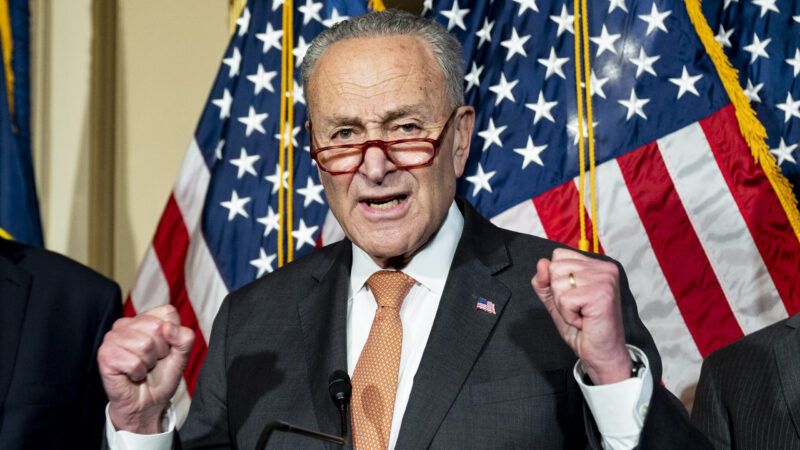Turning the Government Shutdown Into a Fight About the Filibuster Is a Terrible Idea
Democrats should use the shutdown to curb the Trump administration's worst authoritarian abuses, not to try to goad Republicans into eliminating an important check on executive excess.

Democrats' stated reason for opposing Republicans' "clean" continuing resolution to keep the government open is that the spending bill doesn't extend expiring Obamacare premium subsidies or roll back recent restrictions on migrants receiving government health care subsidies.
Liberal commenters have asserted a second, strategic reason why Democrats shouldn't provide the 60 votes necessary to pass a "clean" continuing resolution: There's no guarantee that Republicans won't turn around and cut spending supported by Democrats once the government is reopened.
"It takes 60 votes to pass appropriations legislation, but only 50 votes to pass a rescission package clawing appropriations back," writes Matt Yglesias in a Slow Boring post yesterday. "Trump is now asking Democrats to provide cross-party votes for appropriations that they can unilaterally backtrack on and not even offering verbal promises to refrain from doing this. This is why the government is shutting down."
The potential upside of Democrats sticking to their guns on the shutdown, he says, is that Republicans will eventually decide to nuke the filibuster and pass a continuing resolution with a mere majority to reopen the government.
To be blunt, I don't think any part of this argument makes much sense.
Firstly, the Trump administration is using the current shutdown as a legal justification to eliminate employees and cancel discretionary grants to Democratic states.
The actual legality of these moves might be tenuous. But the administration's case that it does have the power to cut spending and fire employees unilaterally is made stronger by a government shutdown.
So, if the point of the shutdown is to prevent the Trump administration from cutting funding to Democratic priorities, it's doing the opposite.
Secondly, the odds that the Trump administration and a mere majority of Congressional Republicans will turn around and cut a bunch of spending included in a Democrat-supported continuing resolution seem minimal.
It would require Republicans to vote to eliminate spending they had just approved. Even in our increasingly shameless politics, that would open them up to charges of hypocrisy and dirty dealing.
Moreover, Congressional Republicans just do not have much of an appetite for actually cutting spending. This isn't speculation. We know this.
Recall that the second Trump administration spent its early honeymoon phase giving a chainsaw-wielding Elon Musk carte blanche to shred the federal bureaucracy.
The fiscal results of this blitz boiled down to the White House proposing a $9.5 billion rescission package, which Congressional Republicans whittled down to $8.9 billion.
Any dollar of federal spending that's cut is welcome, particularly if we're eliminating public broadcasting and the most frivolous foreign aid programs. Still, in the context of the $1.8 trillion federal discretionary budget that Congress is currently fighting over, these cuts are minuscule.
Even in their DOGEiest moment, a Republican-controlled Congress was willing to cut roughly half a percent of that spending.
Odds that they'll get Democratic support to reopen the government now, and then discover a bunch more line items they want to cut with party-line votes seem slim indeed.
Guarding against that unlikely outcome by shutting down the federal government, thus giving an excuse (and legal cover) for the Trump administration to cut spending without any Congressional oversight, makes no sense on Democrats' own terms.
The slightly more sophisticated case for Democrats' shutdown politics is that this, at last, could convince Republicans to eliminate the hated filibuster.
Liberals have obviously long viewed the filibuster as a primary impediment to their various plans to expand the size and scope of the federal government. Eliminating it would also end the allegedly illogical arrangement whereby it takes more votes to approve spending than it does to cut it, the argument goes. If Republicans can be convinced to nuke it to end the current shutdown, so much the better.
I, of course, get why liberals don't like the filibuster. Still, it's not inherently ridiculous to require more votes to spend money than to not spend it.
Our entire constitutional system is premised on the idea that it should be harder for government to do something than not do something, or to stop doing something. States require supermajorities to raise taxes, not cut taxes. Grand juries have to sign off on prosecutors filing charges, not them dropping charges.
A built-in bias against government claiming new powers and spending more money is an important safeguard of liberty.
That should be abundantly clear in this present moment, when the Trump administration experiments with new and interesting forms of lawless executive overreach every day. That liberals would see now as the time to goad Republicans into ending the filibuster, thereby ceding any countermajoritarian check they have on the GOP-controlled White House and Congress, is insane.
It's regrettable that Democrats are using this shutdown to push for an extension of distortionary health insurance subsidies that were always supposed to be temporary.
I'd much rather see them condition their support for reopening the government on the Trump administration stopping its most authoritarian initiatives, from intimidating broadcast networks to fighting the drug war with drone strikes.
That would productively shift the conversation about the shutdown to the White House's worst abuses of power, most of which are also quite unpopular. It's the best tool they have to get the Trump administration to change course on its most ham- and iron-fisted tactics.
In contrast, Democrats saying that they'll just not vote for any spending bills in the hopes of eliminating the filibuster seems unwise from their own self-interested perspective and dangerous for the country as a whole.
Rent Free is a weekly newsletter from Christian Britschgi on urbanism and the fight for less regulation, more housing, more property rights, and more freedom in America's cities.


Show Comments (18)